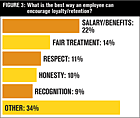
FSU students attend mock employment interviews each year, administered by the school’s HVACR advisory panel members.
BIG RAPIDS, Mich. - Both young and old have many career choices, whether they are just starting out or making a mid-life change. The rise of “techno-geekie” careers has pulled students away from traditional careers in the construction and services trades. Whether there is a shift back depends on how well that industries like HVACR sell the trade as a viable career choice.
Fortunately, there are students in the HVACR trade who enjoy the career opportunities available to them and have enrolled in post-secondary schools to set a foundation for their future. One of the premier institutions for HVACR training and education - Ferris State University (FSU) - was the recent backdrop for aNEWSsurvey on what current HVACR students expect from their future employers now that they have chosen HVACR as a career. But beyond that, we wanted to find out how employers can keep them interested enough in the trade to make it a lifelong career for them.
Part one of this two-part series examines answers to what students expect from their future employers and what ways these employers can encourage or discourage people from continuing a career in HVACR. Part two will examine why it is so difficult to get people interested in HVACR and ways the trade can encourage more people to make HVACR a career.
NO. 1 EMPLOYER QUALITY
It is easy to imagine that most job applicants are looking for a company that pays well, treats its employees good, offers a career path, and helps to further an employee’s education. All of those combined would make for an ideal scenario. But we don’t live in an ideal world, and not every employer possesses these redeeming qualities.Most of the FSU HVACR students listed more than one quality they are looking for in a future employer. However, in order to adhere to the guidelines of each question, the first answer each gave is the one that was recorded for this survey.
One quality that stands out among all is the security of an HVACR career. One of the most common characteristics of the HVACR trade is that it is not prone to losing jobs to overseas competition - because the jobs are local.

“The way that jobs are being sent overseas, the most obvious quality would be that the company remain in the U.S.,” said Darin Theye. “The HVACR industry is a very safe career choice for the simple fact that its jobs can’t be shipped away and performed by someone in a third world country.”
Job security is not just a result of a localized service; it is also a result of a well-established company. One student wrote, “With the way the economy is, I am primarily concerned with finding a company that has a plan for the future - reflecting stability.”

FSU student Brian Sippert dressed up for the mock interview and stated that he is confident that he will get a good job in HVACR once he graduates.
Advancement opportunities was another popular reply by FSU students. Their answers showed that students are not content to just land a job and preferred to use their first job as a stepping-stone to future opportunities. In order to provide for advancement opportunities, employers must show their support by encouraging workers to participate in ongoing training.
“The No. 1 quality I am looking for is the employer’s willingness to help an employee strive to reach his or her full potential,” said Sarah Kelly. Aaron Palmer noted, “I want to go where there is room for promotion. It would be nice to be able to climb up the ladder and grow with the company.”

FSU student Dustin Branting began working for a South Carolina HVAC contractor and is looking for a good job to support his wife and future family.
LENGTH OF SERVICE
Palmer noted he would be willing to grow with a company, which suggests he would want to stay with his chosen company for many years, perhaps an entire career. Prior to the Baby Boomer generation, it was common for a worker to stay with the same company for an entire career. Today, it is more the exception than the rule. For example, according to the Bureau of Labor Statistics, people born between 1957 and 1964 (“young” Baby Boomers) averaged 10.8 job changes in the years between the 18th and 42nd birthday.But the FSU poll proved that people who have yet to enter the job market have a totally different view of job changes.
According to the FSU students surveyed, an overwhelming majority (86 percent) said they would be willing to work for the same company if a number of conditions existed (See Figure 2). Many of the students would stay if they were “treated right” and “compensated well.”

One student said it would be an honor to work for the same employer for a lifetime but added, “this is almost a false reality because most employers lose sight of the potential and value of their employees.”
“If they treated me well, I would have no reason to leave,” said James Magyar.
Another student took the other point of view. “It would get boring to work in the same place,” the student said. “I want to see different things and places.”

ENCOURAGING AND DISCOURAGING WORKERS
Pay and benefits was the most popular answer to the question of encouraging loyalty (Figure 3). But almost as important was respect and fair treatment. Employees want to know they are an important part of the team and that the boss pays attention to them.“Dangle the carrot instead of whipping your behind,” said Andrew Kobe. “Show your employee you want and trust their work. If you do, they will show you the same trust.”
“I think the best way to encourage loyalty is for an employer to be loyal to an employee,” said Mark Brower. “If an employer comes through on what he has promised, the employee will be loyal to the company.”

“Encourage extra pay if the job gets done earlier than scheduled,” said Dan Hanson. “And if you offer a bonus for getting it done right and on time, pay the bonus, not just part of it.”
Ben Quist said communication is a big part of respect. “I have a lot more respect for employers who climb down from their soapbox and talk to their employees with respect and in a decent tone - not by popping a vein in their forehead.”
Watch for part two of this series, which will examine responses to why it is difficult to get people interested in HVACR and ways to encourage more people to enter the HVACR profession. For a complete list of all responses, e-mailNEWS’Business Editor John R. Hall at johnhall@achrnews.com.
Publication date:12/01/2008



